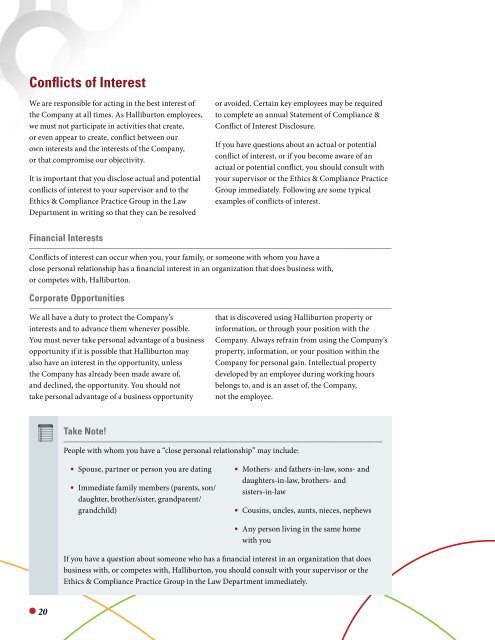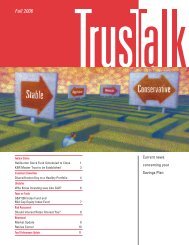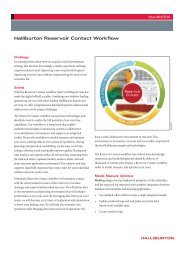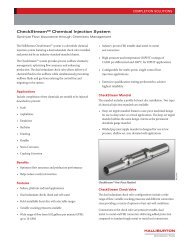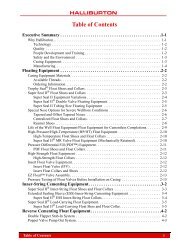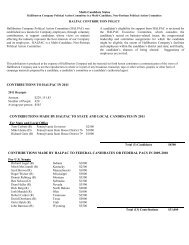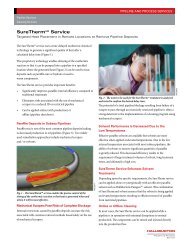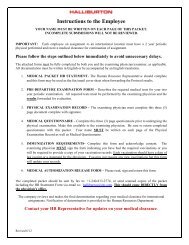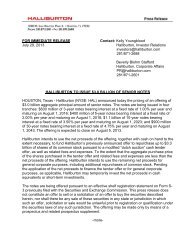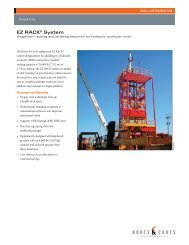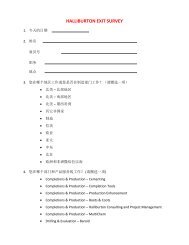COBC - Code of Business Conduct - Halliburton
COBC - Code of Business Conduct - Halliburton
COBC - Code of Business Conduct - Halliburton
You also want an ePaper? Increase the reach of your titles
YUMPU automatically turns print PDFs into web optimized ePapers that Google loves.
Conflicts <strong>of</strong> Interest<br />
We are responsible for acting in the best interest <strong>of</strong><br />
the Company at all times. As <strong>Halliburton</strong> employees,<br />
we must not participate in activities that create,<br />
or even appear to create, conflict between our<br />
own interests and the interests <strong>of</strong> the Company,<br />
or that compromise our objectivity.<br />
It is important that you disclose actual and potential<br />
conflicts <strong>of</strong> interest to your supervisor and to the<br />
Ethics & Compliance Practice Group in the Law<br />
Department in writing so that they can be resolved<br />
or avoided. Certain key employees may be required<br />
to complete an annual Statement <strong>of</strong> Compliance &<br />
Conflict <strong>of</strong> Interest Disclosure.<br />
If you have questions about an actual or potential<br />
conflict <strong>of</strong> interest, or if you become aware <strong>of</strong> an<br />
actual or potential conflict, you should consult with<br />
your supervisor or the Ethics & Compliance Practice<br />
Group immediately. Following are some typical<br />
examples <strong>of</strong> conflicts <strong>of</strong> interest.<br />
Financial Interests<br />
Conflicts <strong>of</strong> interest can occur when you, your family, or someone with whom you have a<br />
close personal relationship has a financial interest in an organization that does business with,<br />
or competes with, <strong>Halliburton</strong>.<br />
Corporate Opportunities<br />
We all have a duty to protect the Company’s<br />
interests and to advance them whenever possible.<br />
You must never take personal advantage <strong>of</strong> a business<br />
opportunity if it is possible that <strong>Halliburton</strong> may<br />
also have an interest in the opportunity, unless<br />
the Company has already been made aware <strong>of</strong>,<br />
and declined, the opportunity. You should not<br />
take personal advantage <strong>of</strong> a business opportunity<br />
that is discovered using <strong>Halliburton</strong> property or<br />
information, or through your position with the<br />
Company. Always refrain from using the Company’s<br />
property, information, or your position within the<br />
Company for personal gain. Intellectual property<br />
developed by an employee during working hours<br />
belongs to, and is an asset <strong>of</strong>, the Company,<br />
not the employee.<br />
Take Note!<br />
People with whom you have a “close personal relationship” may include:<br />
• Spouse, partner or person you are dating<br />
• Immediate family members (parents, son/<br />
daughter, brother/sister, grandparent/<br />
grandchild)<br />
• Mothers- and fathers-in-law, sons- and<br />
daughters-in-law, brothers- and<br />
sisters-in-law<br />
• Cousins, uncles, aunts, nieces, nephews<br />
• Any person living in the same home<br />
with you<br />
If you have a question about someone who has a financial interest in an organization that does<br />
business with, or competes with, <strong>Halliburton</strong>, you should consult with your supervisor or the<br />
Ethics & Compliance Practice Group in the Law Department immediately.<br />
20


